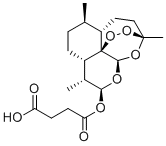All AbMole products are for research use only, cannot be used for human consumption.

Artesunate is a potential STAT3 inhibitor that acts on the small cell lung cancer cell line H69 with an IC50 value of < 5 μM and is also used in antimalarial studies. Artesunate also promotes ROS signaling and lipid peroxidation by increasing the formation of variable iron pools, ultimately leading to iron death in pancreatic cancer cells.
| Cell Experiment | |
|---|---|
| Cell lines | SKM-1 cells |
| Preparation method | Growth inhibition assay: The SKM-1 cells (1×105/mL) are firstly seeded in 96-well plates. Artesunate is diluted in 0.1% dimethyl sulfoxide (DMSO) producing 0, 12.5, 25, 50µg/mL concentrations and added to the SKM-1 cells with 100 µl per well. A negative control is treated with 0.1% DMSO. At 0, 24, 48, and 72 hours, same amount of MTT solution is added into each well and cultured for extra 4 hours. MTT treated cells are fixed with 150 µL DMSO for 30 min at room temperature and then determined with Evolution 201 and 220 UV-Vis spectrophotometer system at 540 nm. |
| Concentrations | 0, 12.5, 25, 50 µg/mL |
| Incubation time | 0, 24, 48, and 72 h |
| Animal Experiment | |
|---|---|
| Animal models | BALB/c mice |
| Formulation | Dissolved in DMSO and diluted with sterile PBS |
| Dosages | 100 mg/kg/day |
| Administration | i.p. |
| Molecular Weight | 384.42 |
| Formula | C19H28O8 |
| CAS Number | 88495-63-0 |
| Solubility (25°C) | DMSO: ≥ 60 mg/mL |
| Storage |
Powder -20°C 3 years ; 4°C 2 years In solvent -80°C 6 months ; -20°C 1 month |
| Related STAT Products |
|---|
| HP590
HP590 is an orally active, novel and potent STAT3 inhibitor (STAT3 luciferase activity: IC50=27.8 nM; ATP inhibition: IC50=24.7 nM). |
| 1-(4-Chloro-3-(trifluoromethyl)phenyl)-3-(4-(4-cyanophenoxy)phenyl)urea
STAT3-IN-7 is a Sorafenib analogue and potently inhibits the phosphorylation of STAT3. |
| HJC0123
HJC0123 is a novel STAT3 inhibitor that suppresses the fibrogenic properties of HSCs. HJC0123 reduced the phosphorylation, nuclear translocation, and transcriptional activity of STAT3. HJC0123 treatment resulted in the inhibition of HSCs proliferation at submicromolar concentrations. It decreased the expression of STAT3-regulated proteins, induced cell cycle arrest, promoted apoptosis and downregulated SOCS3. |
| ODZ10117
ODZ10117 is a small molecule inhibitor of STAT3. ODZ10117 inhibited migration and invasion and induced apoptotic cell death by targeting STAT3 in glioblastoma cells. |
| OPB-111077
OPB-111077 is a first-in-class, novel, oral inhibitor of STAT3 and mitochondrial oxidative phosphorylation (OXPHOS) with anticancer activity. OPB-111077 inhibits mitochondrial respiratory chain complex I, which leads to inhibition of energy production and activation of the AMPK-mTOR energy stress sensor pathway. |
All AbMole products are for research use only, cannot be used for human consumption or veterinary use. We do not provide products or services to individuals. Please comply with the intended use and do not use AbMole products for any other purpose.


Products are for research use only. Not for human use. We do not sell to patients.
© Copyright 2010-2024 AbMole BioScience. All Rights Reserved.
